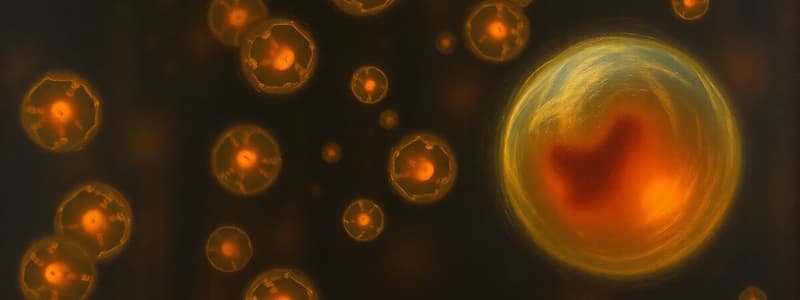Podcast
Questions and Answers
What is the primary location where T cell precursors complete their maturation?
What is the primary location where T cell precursors complete their maturation?
- Spleen
- Bone marrow
- Lymph nodes
- Thymus (correct)
Which process allows T cells to recognize self-MHC during their development?
Which process allows T cells to recognize self-MHC during their development?
- Negative selection
- Positive selection (correct)
- T cell activation
- Co-receptor selection
What happens to thymocytes that do not recognize an MHC molecule within 3-4 days of initial expression?
What happens to thymocytes that do not recognize an MHC molecule within 3-4 days of initial expression?
- They become activated
- They die (correct)
- They migrate to the spleen
- They undergo positive selection
Which cells mediate positive selection in the thymus?
Which cells mediate positive selection in the thymus?
What is the outcome for CD4LOW CD8HIGH thymocytes that recognize MHC class I molecules?
What is the outcome for CD4LOW CD8HIGH thymocytes that recognize MHC class I molecules?
What is a characteristic of thymocytes that survive both positive and negative selection?
What is a characteristic of thymocytes that survive both positive and negative selection?
In which part of the thymus does negative selection primarily take place?
In which part of the thymus does negative selection primarily take place?
Which cell types play a role in negative selection of thymocytes?
Which cell types play a role in negative selection of thymocytes?
What primarily influences the survival or death of thymocytes during selection?
What primarily influences the survival or death of thymocytes during selection?
What is the role of co-receptor downregulation during T cell development?
What is the role of co-receptor downregulation during T cell development?
What role does IL-2 play in T cell activation?
What role does IL-2 play in T cell activation?
Which process ensures that T cells recognize self-MHC molecules during their development?
Which process ensures that T cells recognize self-MHC molecules during their development?
What determines the type of effector T cell that a T cell will become?
What determines the type of effector T cell that a T cell will become?
During T cell activation, what is the significance of the co-stimulatory signal B7:CD28?
During T cell activation, what is the significance of the co-stimulatory signal B7:CD28?
What is the primary role of T cells in immune defense?
What is the primary role of T cells in immune defense?
What is the significance of cell adhesion molecules (CAMs) in T cell activation?
What is the significance of cell adhesion molecules (CAMs) in T cell activation?
What characterizes the transition of naive T cells to effector T cells?
What characterizes the transition of naive T cells to effector T cells?
What is the first step in T cell activation?
What is the first step in T cell activation?
Which T cell subset is primarily associated with helping other immune cells?
Which T cell subset is primarily associated with helping other immune cells?
What physiological process occurs during T cell activation following antigen recognition?
What physiological process occurs during T cell activation following antigen recognition?
Flashcards
Positive Selection
Positive Selection
The stage of T cell development where immature T cells learn to recognize and bind to self-MHC molecules, a crucial step for immune system function.
Negative Selection
Negative Selection
A process in T cell development where immature T cells that bind too strongly to self-MHC-peptide complexes are eliminated, preventing autoimmune reactions.
T Cell Activation
T Cell Activation
The process by which T cells become mature and capable of recognizing and responding to specific antigens presented by antigen-presenting cells (APCs).
Antigen-Presenting Cells (APCs)
Antigen-Presenting Cells (APCs)
Signup and view all the flashcards
MHC Class I
MHC Class I
Signup and view all the flashcards
MHC Class II
MHC Class II
Signup and view all the flashcards
CD8+ T Cell (Cytotoxic T Cell)
CD8+ T Cell (Cytotoxic T Cell)
Signup and view all the flashcards
CD4+ T Cell (Helper T Cell)
CD4+ T Cell (Helper T Cell)
Signup and view all the flashcards
Cytokines
Cytokines
Signup and view all the flashcards
Naive T Cell
Naive T Cell
Signup and view all the flashcards
T cell monitoring of APCs
T cell monitoring of APCs
Signup and view all the flashcards
T cell development
T cell development
Signup and view all the flashcards
T cell activation & differentiation
T cell activation & differentiation
Signup and view all the flashcards
Positive and Negative selection of T cells
Positive and Negative selection of T cells
Signup and view all the flashcards
B7:CD28 co-stimulation
B7:CD28 co-stimulation
Signup and view all the flashcards
T cell clonal expansion
T cell clonal expansion
Signup and view all the flashcards
IL-2's role in T cell activation
IL-2's role in T cell activation
Signup and view all the flashcards
Effect of cytokines on T cell differentiation
Effect of cytokines on T cell differentiation
Signup and view all the flashcards
T cell mediated immunity
T cell mediated immunity
Signup and view all the flashcards
T cell circulation & antigen seeking
T cell circulation & antigen seeking
Signup and view all the flashcards
Study Notes
T Cell Development and Activation
- T cells develop from hematopoietic stem cells in the bone marrow, but complete maturation in the thymus.
- The thymus is divided into lobules with a cortex and medulla.
- Development stages are identified by the presence/absence of cell-surface markers (TCR, CD3, CD4, CD8).
- T-cell precursors proliferate extensively in the thymus, and most die there.
- T cells differentiate into two lineages: γ:δ and α:β.
- α:β T cells further distinguish into CD4+ and CD8+ T cells.
- T cells that recognize self-MHC (positive selection) and are self-tolerant (negative selection) are generated.
Learning Objectives
- Describe the stages of T cell development from hematopoietic stem cells in the bone marrow to mature T cells.
- Recognize positive and negative selection in T cell development.
- Describe the process of T cell activation.
- Understand T cell-mediated immune responses.
Positive Selection
- Occurs in the thymic cortex.
- Mediated by thymic cortical epithelial cells expressing MHC class I and II proteins.
- Thymocytes that do not recognize MHC molecules within 3-4 days of α:β expression die.
- Successful recognition by cortical epithelial cells results in a survival signal.
Co-receptor Selection
- Recognition of an MHC molecule by one co-receptor results in downregulation of the other co-receptor gene.
- CD4lowCD8high cells survive if they recognize MHC class I molecules.
- CD4highCD8low cells survive if they recognize MHC class II molecules.
- Co-receptor recognition by epithelial cells triggers a maturation signal.
Negative Selection
- Occurs in the thymic cortex and medulla.
- Mediated by cortical epithelial cells, macrophages, and dendritic cells.
- Thymocytes that strongly recognize self-peptide:MHC complexes die.
- Different binding affinities to MHC-peptide drive survival or death (positive/negative selection).
- Self-peptides are derived from thymic and ubiquitous blood proteins.
- T cells that successfully complete positive, co-receptor, and negative selection are single positive, self-tolerant, naïve T cells.
T Cell Activation
- Antigen recognition occurs on antigen-presenting cells (APCs) by MHC-peptide complexes.
- Co-stimulatory signals are delivered (e.g., B7:CD28).
- T cells enter the cell cycle (G1) for proliferation, known as clonal expansion.
- Interleukin-2 (IL-2) mediates proliferation and differentiation into effector cells.
- Cytokines expressed by APCs determine the effector T cell type.
T Cell-Mediated Immunity
- Naive T cells circulate between blood and lymphoid tissues.
- Activation occurs via antigen co-stimulation and recognition of MHC-peptide complexes on APCs.
- Cell adhesion molecules (CAMs) mediate the process.
- T cells monitor MHC-peptide complexes within lymphoid tissue.
Studying That Suits You
Use AI to generate personalized quizzes and flashcards to suit your learning preferences.




